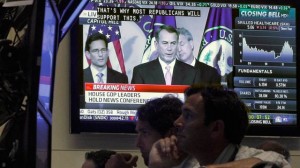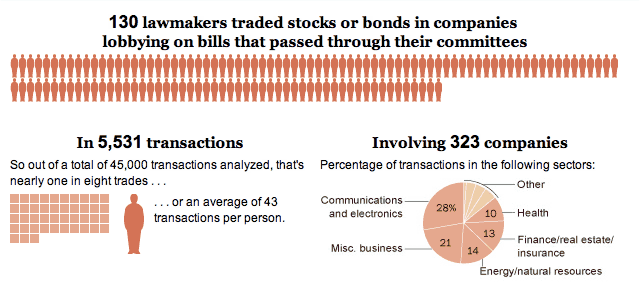
House Speaker John Boehner, R-Ohio, is seen on a television screen on the floor of the New York Stock Exchange. (AP Photo/Richard Drew)
What with huge campaign investments, er, contributions from the financial industry and the recent smooch fest between JPMorgan Chase CEO Jamie Dimon and the Senate Banking Committee, the romance between Capitol Hill and Wall Street seems never to have flourished so brightly. Now, in two fascinating, exhaustive and ultimately infuriating articles, The Washington Post has conducted an analysis of congressional financial transactions and, yes, love is in the air. The Postreporters didn’t turn up evidence of insider trading but did discover that “lawmakers routinely make trades that raise questions about whether members of Congress have an investing advantage over members of the public.”
You’ll recall that back in November, Rep. Spencer Bachus of Alabama, Republican chairman of the House Financial Services Committee was the poster child of a “60 Minutes” report investigating allegations of congressional insider trading. As we noted earlier this year:
“Just before the 2008 financial meltdown, Rep. Bachus attended closed door briefings with Treasury Secretary Hank Paulson and Federal Reserve Chair Ben Bernanke. ‘While Congressman Bachus was publicly trying to keep the economy from cratering,’ 60 Minutes reported, ‘he was privately betting that it would, buying option funds that would go up in value if the market went down. He would make a variety of trades and profited at a time when most Americans were losing their shirts’ (Bachus said the 60 Minutes account was ‘absolutely false’).”
Rep. Bachus was cleared by the Office of Congressional Ethics and even swatted away a GOP primary challenge back home. Nevertheless, the 60 Minutes expose helped lead to passage of the years-delayed STOCK Act, which forbids insider trading by legislators and their staffs, as well as certain executive branch officials. But as the investigative team from The Washington Post reports, “The act does not prohibit lawmakers from trading stocks in companies that appear before them or from reworking their portfolios after briefings with senior administration officials.”
According to the first of the Post pieces, “One-hundred-thirty members of Congress or their families have traded stocks collectively worth hundreds of millions of dollars in companies lobbying on bills that came before their committees, a practice that is permitted under current ethics rules… The lawmakers bought and sold a total of between $85 million and $218 million in 323 companies registered to lobby on legislation that appeared before them, according to an examination of all 45,000 individual congressional stock transactions contained in computerized financial disclosure data from 2007 to 2010.”
“Almost one in every eight trades — 5,531 — intersected with legislation. The 130 lawmakers traded stocks or bonds in companies as bills passed through their committees or while Congress was still considering the legislation. The party affiliation of the lawmakers was almost evenly split between Democrats and Republicans, 68 to 62.
Sen. Tom Coburn (R-Okla.) reported buying $25,000 in bonds in a genetic-technology company around the time that he released a hold on legislation the firm supported. Rep. Ed Whitfield (R-Ky.) sold between $50,000 and $100,000 in General Electric stock shortly before a Republican filibuster killed legislation sought by the company. The family of Rep. Michael McCaul (R-Tex.) bought between $286,000 and $690,000 in a high-tech company interested in a bill under his committee’s jurisdiction.”
The second Post article reports that in January 2008, while the subprime mortgage industry was teetering and the Bush White House was using then-House Minority Leader John Boehner as its point man to negotiate a $150 billion stimulus package, Boehner rearranged part of his own financial portfolio. The day before the package was unveiled, he “sold between $50,000 and $100,000 from a more aggressive mutual fund and moved money into a safer investment.”
“Boehner is one of 34 members of Congress who took steps to recast their financial portfolios during the financial crisis after phone calls or meetings with [Treasury Secretary Henry] Paulson; his successor, Timothy F. Geithner; or Federal Reserve Chairman Ben S. Bernanke, according to a Washington Post examination of appointment calendars and congressional disclosure forms.
The lawmakers, many of whom held leadership positions and committee chairmanships in the House and Senate, changed portions of their portfolios a total of 166 times within two business days of speaking or meeting with the administration officials. The party affiliation of the lawmakers was about evenly divided between Democrats and Republicans, 19 to 15.”
Among the others named are Republican Senate Minority Leader Mitch McConnell of Kentucky, Nebraska Democratic Senator Ben Nelson, who after talks with Secretary Paulson sold between $250,000 and $500,000 in Lehman Brothers certificates of deposit and bought hundreds of thousands in Treasury bills, and Democratic Senate Budget Committee Chairman Kent Conrad of North Dakota, who spoke with Paulson and shifted between $150,000 and $300,000 out of three mutual funds in his wife’s 401 (k).
When questioned about the transactions, the legislators, their staffs or financial advisors declined comment or denied using the member’s position to increase or protect investments, saying the timing was coincidental, that the information was available to anyone who could read or hear the news, or that transactions were conducted independently, without the member’s knowledge beforehand.
The Post articles quote the University of Minnesota’s Richard W. Painter, who was President George W. Bush’s chief ethics lawyer:
“If this was going on in the private sector or it was going on in the executive branch, I think the SEC would be investigating… Members of Congress are still loosey-goosey about what they require of themselves. I think it’s time for Congress to impose the same rules on themselves that they impose on others.”
Meanwhile, the Wall Street-Capitol Hill tango dances on.


